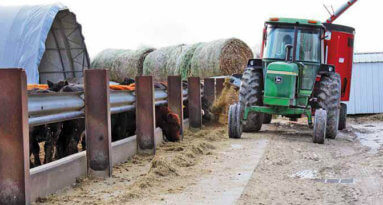Good nutrition is key factor in raising quality beef

Wanda English Burnett Photo
It's feeding time at the Clear Water Simmentals operation near Milan. The cattle are ready for their evening meal as the tractor throws the feed out for them. Leah Meinders said having good nutrition is paramount to having the quality beef they are known for throughout the country. It also helps when the cold temperatures come if the herd is healthy.
As the forecasters kept calling for below zero temperatures this week, farmers in the area were not only listening to the forecasts, but rather adjusting their operations to deal with it. The Polar Vortex, as the meteorologists refer to the sub-zero weather conditions this week, has made its way to Ripley County.
According to Leah Meinders of Clear Water Simmentals, certified livestock producers in the Milan area, their herd of nearly 300 quality breeding stock is being looked at with a watchful eye. They have about 100 calves from January to March, and those have to be watched even closer. “They can easily get their ears and tails frostbitten, if they are not dried properly,” she shared with The Versailles Republican. She and husband, Jeff, have been involved in farming for 35 years.
Cattle that are calving are inside the barn where they have straw beds. It’s a delicate balance when they give birth. The babies have to be put inside a heater box until they are dry. They also have to have their mother’s first milk. “We check them throughout the day and night,” Leah said, noting there’s not much room for error when it comes to the size and value of operation they produce. As you turn the corner and get beside the barn where the cows are contently eating hay, you can feel the difference. The wind is blocked, and the cold is not as prominent. Even the cattle that are “free range” in big fields, congregate to the wooded area when it is this cold where they are sheltered.
For those who think farmers might not be as busy in the winter, it’s the opposite. Farmers like the Meinders are extremely busy this time of year. She used the words, “very, very, very busy!” They raise purebred Simmental cattle that are sold throughout the United States. They have approximately three live sales a year, with Internet bidding bringing the livestock right into the farmer’s living room. “I’ve done it myself,” Leah laughed.
The Meinders have a stockpile of wood chips they put down for the cows to help insulate them from the outside elements. They don’t want to lose any of their herd to freezing temperatures. Their cattle are worth more than just market value, she explained, saying the value of breeding stock genetically is very high. They do have some that don’t meet all the criteria for the purebred stock they turn out and those are sold to those who enjoy consuming good homegrown meat.
Leah noted that the extreme swing in temperatures is what is really hard on their herd. She said going from -25 degrees to 55 degrees this weekend, is harder on the cattle than a steady cold. She also noted that the extreme rains Indiana has been experiencing is also hard on the cattle.
The Meinders have had cattle that have died, but, they haven’t lost one to freezing to death. It’s not a statement to brag, but rather one they are thankful for.
They do what they can to protect their assets, and the rest is left up to Mother Nature and God. With Farm Bureau celebrating 100 years focusing on the same mission: to promote agriculture through public education, member engagement, and by advocating for agricultural and rural needs, the Meinders are doing their part to raise high quality cattle that are shown at 4-H fairs across the nation and are on the dinner table of countless Americans.

